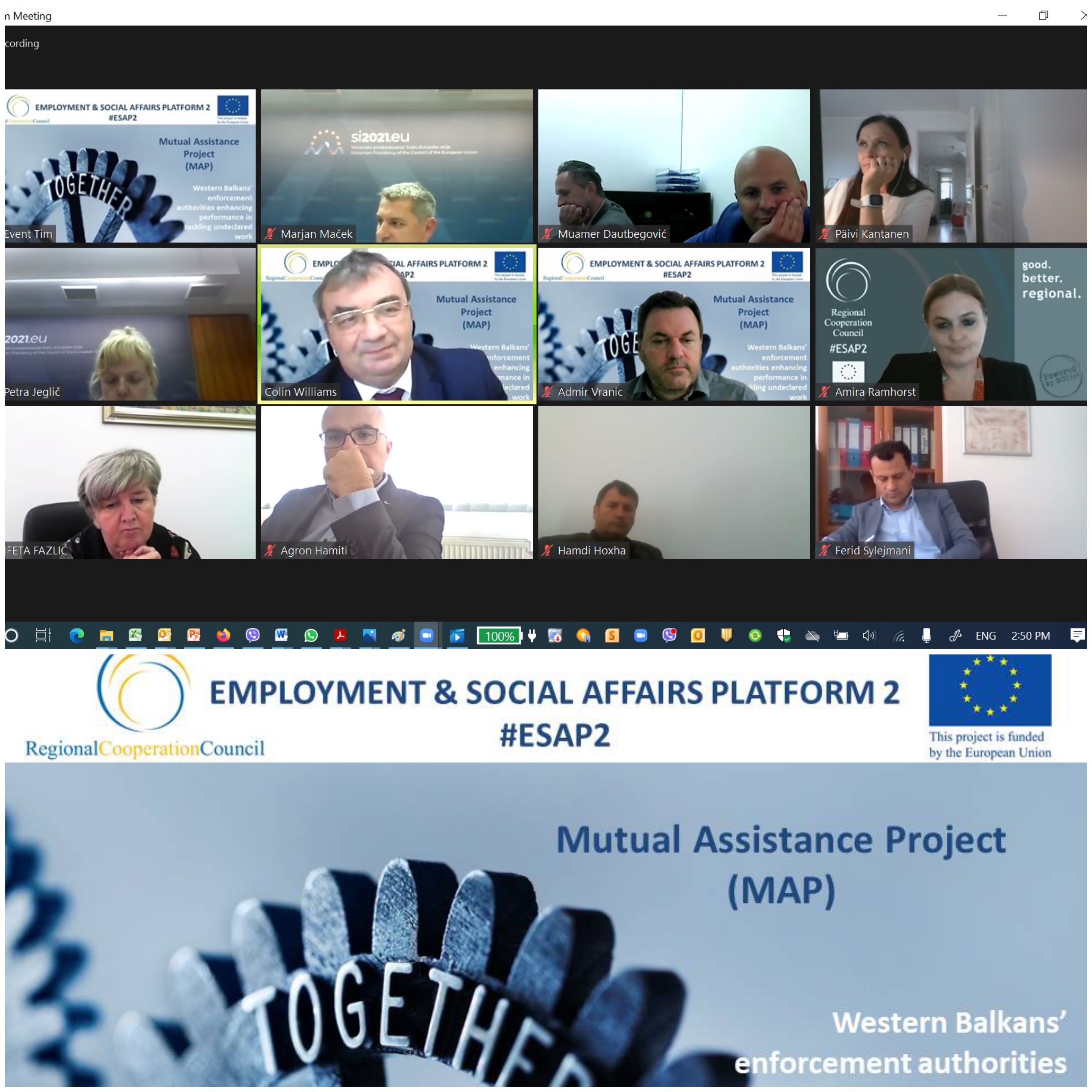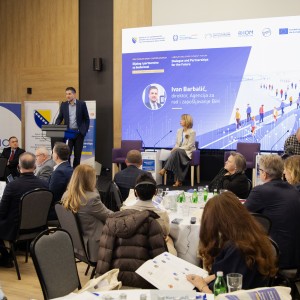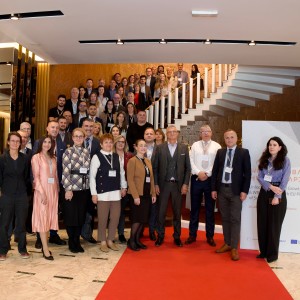News
06 October 2021 |News
RCC ESAP 2: Mutual Assistance Project on how to enhance performance of enforcement authorities in tackling undeclared work continues with Tax Administration Partners from the Western Balkans and Europe

3rd session of ESAP 2 MAP with peer experts from Western Balkans' and European Enforcement Authorities, 6 October 2021 (Photo: RCC ESAP 2)
3rd MAP session co-hosted by the RCC ESAP 2 and Tax Administration of Federation of Bosnia and Herzegovina
The 3rd session of the Mutual Assistance Project(s) (MAP) for enforcement authorities in the Western Balkans aimed at enhancing of their performance in tackling undeclared work, co-hosted by the Regional Cooperation Council’s (RCC) Employment and Social Affairs Platform (ESAP 2) and the Tax Administration of Federation of Bosnia and Herzegovina, Bosnia and Herzegovina, took place today, 6 October 2021, online.
Amira Ramhorst, ESAP 2 Project’s Team Leader welcomed all the participants, the co-host, the Tax Authority of Federation BiH, Bosnia and Herzegovina, and peer experts from the Western Balkan region and European countries (Tax Administration and Labour Inspectorate representatives from Kosovo*, representative of the Ministry of Economy and Employment of Finland, and representatives of the Financial Administration, Ministry of Finance, Slovenia), underlining the importance of the holistic approach in tackling undeclared work as well as peer mutual-learning opportunities and good practices that we can learn from and tailor to different economies to enhance performance and enable more effective transition from undeclared work to declared work.
Topics discussed at this MAP session included strategic objectives of the Tax Administration and joining-up strategy across government; coordination among enforcement authorities but also cooperation with social partners; collection, exchange and analysis of data; practical approaches to enforcement through penalties to increase probability of detection; supply- and demand-side incentives; and finally education and awareness raising on benefits of declared work, and building trust in the enforcement authorities.
“Adopting the strategic objective of ‘transforming undeclared work into declared work’ has significant implications for enforcement authorities, as until now many enforcement authorities have acted to reduce undeclared work. Once the strategic objective of enforcement authorities, such as labour inspectorates, social security institutions and tax authorities, becomes transforming undeclared work into declared work, the core target indicator becomes for example, the number of businesses or labour relations that are formalised each year, rather than the number of cases of undeclared work detected and punished”, said Colin Williams, ESAP 2 Lead Expert on undeclared work, explaining how the change of the strategic objective would affect the approach and performance evaluation of enforcement authorities, adding that the focus should be put on measures that incentivize employers to transform undeclared work into declared work.
The MAP co-hosts from the Tax Administration of Federation of Bosnia and Herzegovina , Bosnia and Herzegovina shared their practices and experiences with other peer experts, soliciting their experiences and good practices as applicable, especially for challenging situations. Dynamic and open discussion led to a series of identified practices that can be considered to enhance performance, many of which relate to enhanced coordination of activities with other institutions and sharing of data and knowledge.
This MAP session, like the previous ones, ended up with a series of suggestions on how to enhance performance in tackling undeclared work, that will be shared with all meeting participants for further consideration and potential application in practice.
The ESAP 2 MAPs are designed as hands-on assistance to enhance performance of a host institution and provide exchange of peer experiences, in order to, where possible, replicate good practices of peers from the WB region, European Union and other European countries. The format of open and transparent dialogue of MAPs is a non-judgemental, peer-learning opportunity for all the participants and contributes to solving issues, providing advice and implementation support.
Please find dates for the next MAP sessions on the ESAP 2 web calendar of events.
* This designation is without prejudice to positions on status, and is in line with UNSCR 1244/1999 and the ICJ Opinion on the Kosovo declaration of independence.





